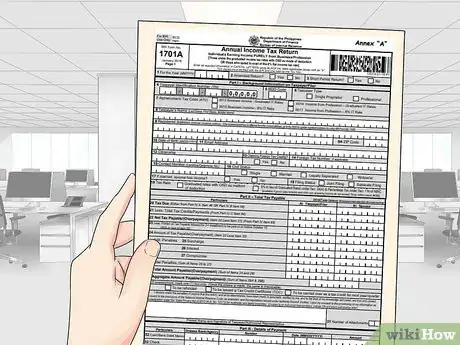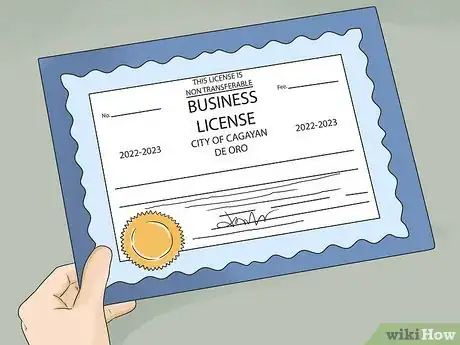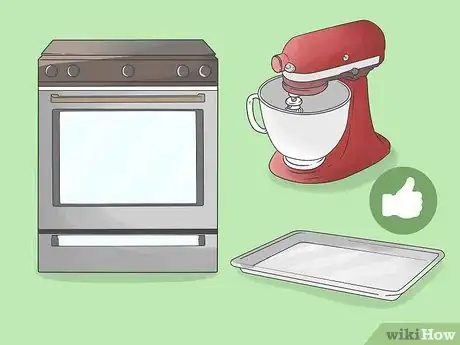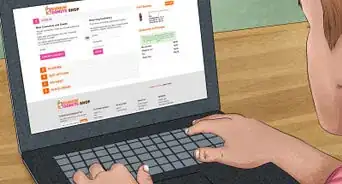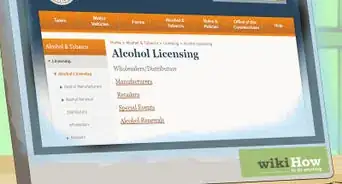This article was co-authored by Miri Rodriguez. Miri Rodriguez is a Business Brand Consultant and the Owner & CEO of Be Mindful Be Happy. She has been coaching business and individual brands for over 15 years in the areas of career development, personal development, branding, and storytelling for impact. She is the best-selling author of the award-winning book Brand Storytelling. She holds a Master’s degree in Integrated Communications and Marketing from Georgetown University and various certifications including Copyrighting, Technical Writing, Design Thinking, Six Sigma, and Prosci Change Management.
There are 12 references cited in this article, which can be found at the bottom of the page.
wikiHow marks an article as reader-approved once it receives enough positive feedback. In this case, several readers have written to tell us that this article was helpful to them, earning it our reader-approved status.
This article has been viewed 103,787 times.
If your cookies get rave reviews and you enjoy coming up with new recipes and products, a cookie company could be a lucrative and pleasurable business for you. There's a lot more to running a business than just making great cookies, though. You will also have to handle customer service, bookkeeping, marketing, and food safety, among other things. If you're ready to start your cookie business, take some time to make a solid plan for how exactly you will operate.
Steps
Business Plan and Logistics
-
1Write a business plan. The first step to starting any business is to write a business plan that outlines your plans and goals, including financial projections. You will need to have a good idea of who will work for you, what your expenses will be, how much you will charge for your product, how you will market your product, and who the competition is. It's essential to have the right employees that is trustful and responsible. [1]
- Think about how you can differentiate your product from the competition. It helps if you can fill a specific need and tailor your products to a specific audience. For example, you might offer cookies in more unique flavors than your competition, thus catering towards an audience that wants a more adventurous cookie. Alternatively, you could cater towards an audience with certain dietary restrictions by offering cookies that are vegan or gluten free.
- You need to understand who you're targeting, but don't get too narrow, since, as a new brand and product, you'll need to listen to feedback from your own clientele to fine tune your service.
- Now is also the time to figure out financing. Once you know how you plan on operating your business, you should have some idea how much it will cost upfront and on a monthly basis. Most lending institutions will want to look at your business plan when deciding whether to loan you money, so make sure your business plan is very thorough.
- You should also come up with a name for your business, and maybe even a logo or some sample promotional materials.
- If you've never written a business plan before, you may want to consider hiring a professional to help you.
-
2Incorporate your business. You have several options for how to incorporate your business, depending on how many people are involved, how you want to be taxed, and how much personal liability you are prepared to assume for your business. You may want to discuss your option with a qualified attorney and/or CPA.[2]
- Limited liability corporations (LLCs) are popular among small business owners because they help you avoid double taxation and protect you from being personally liable for money owed by your business. There are other options as well, including sole proprietorships and corporations.
Advertisement -
3Have a plan for taxes. As a self-employed individual, you will be responsible for paying estimated taxes on a quarterly basis and filing an annual tax return. If you do not pay the proper amount, you may end up owing a large tax balance, which will continue to grow with penalties and interest if you don't pay it right away. If you are not knowledgeable about accounting for businesses, you may want to consider hiring an accountant to help you.[3]
- If you plan to sell in a state that has a sales tax, you will need to register your business with the state's Revenue Agency.[4]
-
4Apply for an EIN number. Most businesses will need an Employer Identification Number (EIN), also known as a Federal Tax Identification Number. This number is the business equivalent of an individual's Social Security Number, and is used for tax purposes. You can apply for an EIN on the IRS's website by answering a few simple questions about your business.[5]
- If you do not plan to open a bank account for your business or hire employees, you may not need an EIN to operate certain types of businesses. Check with your local government to learn more.
-
5Get insurance coverage. Insurance can protect you from liability in the case of an accident and can also protect your personal assets. Talk to a local insurance provider to find out what kind of coverage you need.[6]
Licensing and Laws
-
1Find an approved facility. The requirements for commercial kitchens vary drastically from state to state, and even from county to county. It is illegal in some places to sell food that was produced in a residential kitchen. In other areas, you may be able to make certain changes to your existing kitchen or create a new kitchen in a different part of your home that meets the requirements. In this case, you will almost definitely be required to have your kitchen inspected on a regular basis. Contact your county's health department for information specific to your area.[7]
- If you plan to operate your business from home, you will also need to get approval from your local zoning board.
- If you are not permitted to use your home kitchen for your cookie business, you may be able to find an established local business that will allow you to rent out their kitchen during off hours.[8]
- Some states have special provisions for the cottage food industry, which might exempt you from needing a licensed kitchen. There are also restrictions, however, regarding what kinds of products you can produce, where you can sell your products, and how much money you can make. Check with you state's Department of Agriculture and Rural Development to learn more about the local laws you must abide by.[9]
-
2Apply for a business license. In order to legally operate a business, you will need to obtain a general business license from your local city or county government. Depending on the state you live in, you may also be required to apply for licenses or permits specific to the food industry. Make sure you ask about these requirements when applying for your general business license.[10]
-
3Follow good food safety practices. Even if you are allowed to operate your business from your home kitchen, you will still be required to comply with local health codes for the safe handling of food. If you are not familiar with safe food handling, you may want to consider taking a class.[11]
- It is essential to keep accurate records regarding the sourcing of your ingredients and the ultimate destination of each ingredient. The purpose of this is to enable the government to track food borne pathogens in the case of an outbreak.[12]
-
4Label your products correctly. In order to be compliant with federal laws, you must make sure to properly label all of your products with a complete list of ingredients and allergens, as well as nutritional information.[13]
- The USDA provides guidelines for calculating the nutritional values of your products, but if you do not feel comfortable doing this yourself, you can outsource the task to a specialized company.
- Make sure you understand the legal definitions of special phrases like "organic" or "gluten free." If you cannot prove that your products actually meet these stringent requirements, you may not be allowed to use the term.
- Keep in mind that your labels will have to change whenever you make a change to your recipe.
Products and Marketing
-
1Get the right equipment. Depending on local laws and the volume of product that you intend to produce, you may find that you need new equipment. To get your business off to the best start, ensure that you have everything you need to safely and effectively produce and distribute your product.[14]
- Make sure to consider major items, like ovens and mixers, as well as smaller items, like mixing bowls, sheet trays, and packing materials to neatly pack the cookies.
- Think carefully about what equipment is absolutely necessary for the production of your product and what equipment is optional. You may want to save money upfront by only buying essential items, and then upgrading with fancier equipment when your business becomes more established.
-
2Figure out who you will sell to. You have many options for how you will sell your cookies. You could open your own store, sell gift baskets on the internet, sell your product at farmers markets, or attempt to sell them to retail locations like grocery stores.[15] The right choice for you will depend upon the amount of money you have to invest in the business upfront, the regulations imposed on you by federal and local laws, and the buying habits of your target market.
- Keep in mind that certain wholesale customers may demand specific food safety procedures beyond those that are required by law.
-
3Make outstanding products. If you love to bake cookies, this should be the best part of your new job! You may feel overwhelmed by all the other aspects of running your own business, but try not to lose track of your passion for creating amazing cookies.
- Coming up with new and exciting products will keep your brand relevant and your customers happy. Make sure to always keep up with industry trends, as well as the products your competition is offering.
- You might want to get some feedback on different recipes with friends and family, or even from a random sampling of potential customers, before deciding which to produce.
-
4Market yourself. You will never sell your cookies if you can't sell your brand. Make sure that everything about your brand looks professional and that you have a solid plan for how you will effectively communicate with your customers about your latest offerings.[16]
- Never stop doing market research! You need to make sure you are actively meeting your customers' most relevant needs, and these are always changing.
- You might want to consider hiring a marketing agency or a dedicated employee to help with marketing, especially as you grow. Between a professional website, an active social media presence, and print materials, it's easy to get overwhelmed with marketing.
- Once you've sold a customer on the idea of your product, you need to follow through by always providing great quality and a fantastic customer experience.
Expert Q&A
-
QuestionWhy are personal stories important for brands in marketing?
 Miri RodriguezMiri Rodriguez is a Business Brand Consultant and the Owner & CEO of Be Mindful Be Happy. She has been coaching business and individual brands for over 15 years in the areas of career development, personal development, branding, and storytelling for impact. She is the best-selling author of the award-winning book Brand Storytelling. She holds a Master’s degree in Integrated Communications and Marketing from Georgetown University and various certifications including Copyrighting, Technical Writing, Design Thinking, Six Sigma, and Prosci Change Management.
Miri RodriguezMiri Rodriguez is a Business Brand Consultant and the Owner & CEO of Be Mindful Be Happy. She has been coaching business and individual brands for over 15 years in the areas of career development, personal development, branding, and storytelling for impact. She is the best-selling author of the award-winning book Brand Storytelling. She holds a Master’s degree in Integrated Communications and Marketing from Georgetown University and various certifications including Copyrighting, Technical Writing, Design Thinking, Six Sigma, and Prosci Change Management.
Business Brand Consultant Personal stories are relevant because people want to learn more about the people behind the brand, and that makes the brand human. Whether it's someone at the C-suite level or a forefront worker, the relevant stories involve who is working and why. Today, especially after the pandemic, we're looking more at how employees are engaging, not just producing.
Personal stories are relevant because people want to learn more about the people behind the brand, and that makes the brand human. Whether it's someone at the C-suite level or a forefront worker, the relevant stories involve who is working and why. Today, especially after the pandemic, we're looking more at how employees are engaging, not just producing.
Expert Interview
Thanks for reading our article! If you'd like to learn more about starting a business, check out our in-depth interview with Miri Rodriguez.
References
- ↑ https://www.sba.gov/category/navigation-structure/starting-managing-business/starting-business/how-write-business-plan
- ↑ https://www.irs.gov/Businesses/Small-Businesses-&-Self-Employed/Business-Structures
- ↑ https://www.irs.gov/Individuals/Self-Employed
- ↑ https://www.sba.gov/blogs/so-youd-start-home-based-baking-business-now-what
- ↑ https://www.sba.gov/business-guide/launch-your-business/get-federal-state-tax-id-numbers
- ↑ https://oci.wi.gov/Documents/Consumers/PI-085.pdf
- ↑ https://www.sba.gov/blogs/so-youd-start-home-based-baking-business-now-what
- ↑ http://www.entrepreneur.com/businessideas/cookie-gift-business
- ↑ http://www.michigan.gov/mdard/0,4610,7-125-50772_45851_45856---,00.html
- ↑ https://www.sba.gov/blogs/so-youd-start-home-based-baking-business-now-what
- ↑ https://www.sba.gov/blogs/so-youd-start-home-based-baking-business-now-what
- ↑ http://www.fda.gov/Food/ResourcesForYou/Industry/ucm322302.htm
- ↑ http://www.fda.gov/Food/ResourcesForYou/Industry/ucm322302.htm#labeling
- ↑ https://www.sba.gov/blogs/so-youd-start-home-based-baking-business-now-what
- ↑ http://www.entrepreneur.com/businessideas/cookie-gift-business
- ↑ https://www.sba.gov/content/marketing-101-basics
- ↑ http://extension.umaine.edu/publications/4190e/
About This Article
To start a cookie business, begin by developing recipes for unique, delicious cookies that people will love. You can also come up with a catchy name and logo to get people's attention. When you're first starting out, you might want to sell your cookies at places like farmers markets or in gift baskets over the internet. Then, once you become more established, you can look into opening a store or selling your cookies in retail locations like grocery stores. To learn how to apply for a business license for your cookie company, keep reading!


